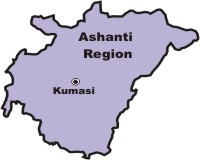 A map of the Ashanti region
A map of the Ashanti region
In a bid to curb prostitution and the prevalence of venereal diseases in their villages, some Asante chiefs, in the 1920s and 1930s, resorted to arresting all unmarried women above the age of 15 and keeping them in detention until they presented husbands.
Adansi, Asokore, Bekwai, Edweso, Effiduasi, and Mansu Nkwanta are some of the notable villages recorded to have been involved in this act during the colonial Gold Coast era.
In a 1996 journal by Jean Allman, published by Cambridge University Press, titled "Rounding Up Spinsters: Gender Chaos and Unmarried Women in Colonial Asante," one of the women who experienced this gave details of what happened:
"We were arrested and just dumped into a room—all of the women of Effiduasi who were not married... The ahemfie [palace] police did the arresting. The women were flirting around and so they became an embarrassment to the King. So, he decided that they should get married... They announced that on such a day all women should be able to show a husband... When we were sent there, we were put into a room... When you mentioned a man's name, it meant that was the man you wanted to marry, so they would release you... You would go home with the man and the man would see your relatives and say, 'I am getting married to this woman.'"
But it wasn’t for free. Once a man agreed to marry the woman who mentioned his name, he paid a small marriage fee to secure her release, but if he rejected the woman, he was either fined or imprisoned.
"The man was then summoned to the court where he would affirm his desire to marry the woman and then pay a 'release fee' of 5 shillings. If the man refused to marry the woman, he was fined. In some cases, the fine was 5 shillings, in others, it was as high as 25. After the woman's release, the man was expected to pay a marriage fee of 7 shillings and one bottle of gin to the woman's family."
In 1932, British government officers in Asante became concerned about the practice, and the Chief Commissioner requested his assistant to make some inquiries into the issue.
In his report to the Chief Commissioner, the assistant revealed that the chiefs had taken action to put an end to indecent practices in their villages.
"The chiefs confirmed the detentions of unmarried women and then justified their actions by arguing that venereal diseases and prostitution were prevalent in their division. The Bekwaihene and his councillors and elders submitted a three-page letter defending their actions in terms of a desire 'to prevent prostitution which we have noticed to bring sterility and incurable venereal diseases.' The solution was, they argued, to 'encourage conjugal marriages among our womenfolk.'"
However, the piece added that "If the chiefs were prepared to offer a concrete solution to the 'problem' of unmarried women, they were far more equivocal in explaining why the 'problem' of women not marrying existed in the first place.
"On the one hand, they argued that 'the tendency... is attributable to the prevalent financial depression which renders the men incapable of conforming with... the expenses of our native customary laws concerning marriage.' On the other hand, the chiefs betrayed much concern about women's growing uncontrollability, fondly recalling 'the good old days of our ancestors... [when] no girl or woman dared to resist when given away in marriage to a suitor by her parents and relatives as is the case now.'"
Though the move helped in getting some women married, not all had a happy ending.
One Kofi Afram, in 1929, is recorded to have taken his case to the customary court after Afuah Buo, the woman whose release he paid for, later refused to marry him.
The plaintiff, Afram, revealed in court that Afuah was showing interest in another man.
In her defence, Afuah noted that Afram was not taking care of her as she expected, hence her decision to move on with another man.
"I live in Asokore. I am a farmer. Some years ago, a gong-gong was beaten and spinsters were to be caught. I was among them (and previously, I was told by the Plaintiff that I must mention his name and he would clear me out). I did, and he came and paid 5 shillings and discharged me... About two weeks after, the Plaintiff does not care for me, nor subsist me. I informed one Attah Biom of the treatment and the Plaintiff said because he was ill, hence he did not do it. What I have to say is that because the Plaintiff did not care for me, nor subsist for me, hence I connected with someone, to get my daily living. That's all I know."
The Asokore Native Tribunal, where the case was heard, "ruled against Afuah Buo, fining her £5 9s od - £3 4s od" as compensation to Afram.
ADG/ KPE